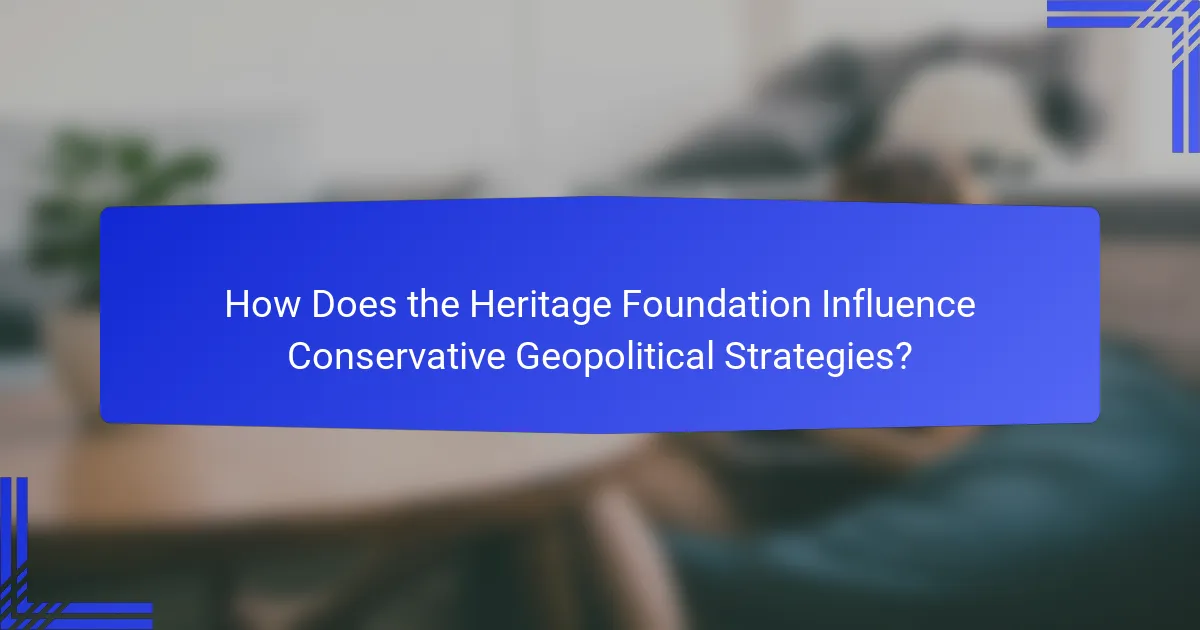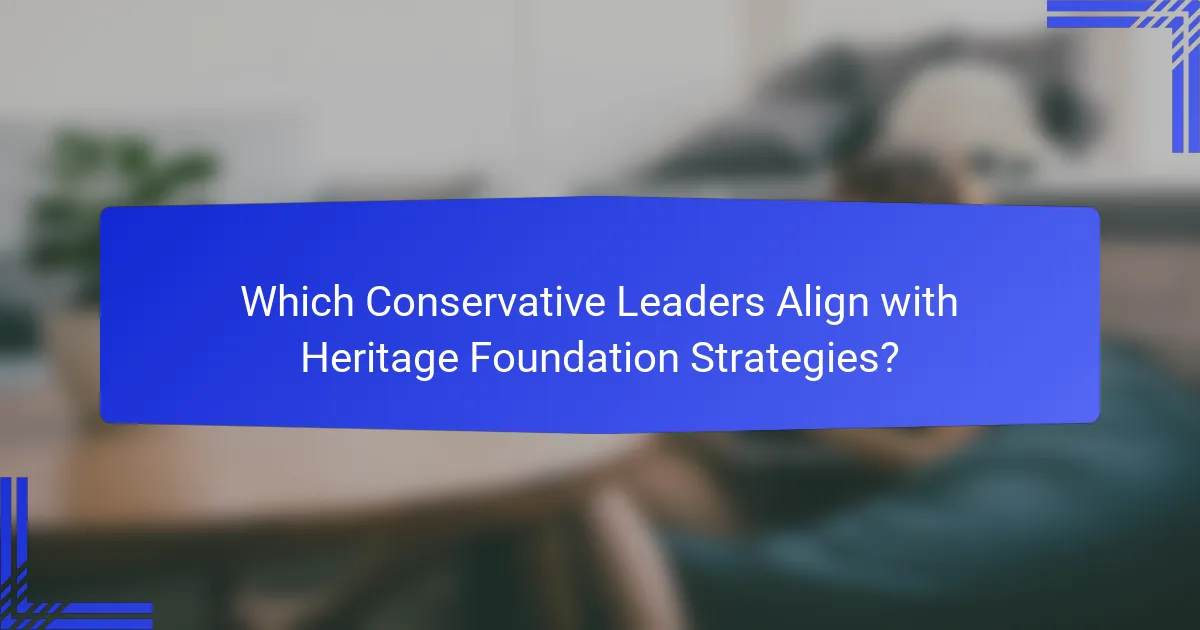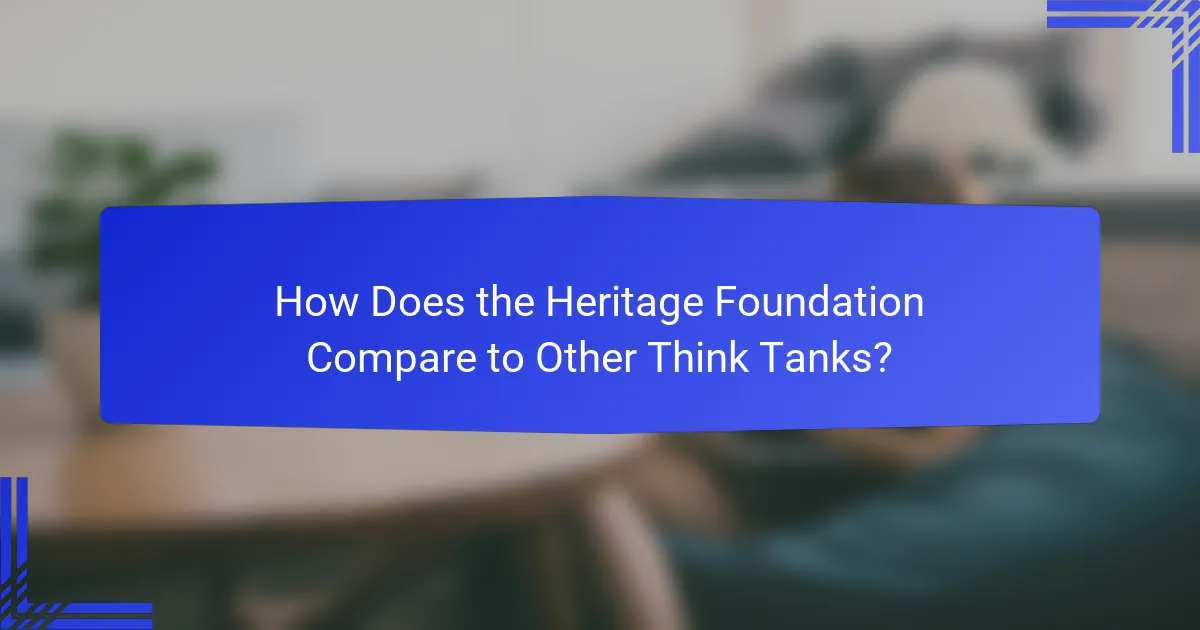The Heritage Foundation plays a pivotal role in shaping conservative geopolitical strategies through its comprehensive policy recommendations and research. By influencing lawmakers and providing a framework for conservative thought, it guides decision-making in critical areas such as national security, trade, and foreign aid. Its emphasis on a strong military presence and free-market principles resonates with many conservative leaders, who align their political agendas with the Foundation’s core principles. For insights on the BRICS influence, check out its role in geopolitical analysis.

How Does the Heritage Foundation Influence Conservative Geopolitical Strategies?
The Heritage Foundation significantly shapes conservative geopolitical strategies through its policy recommendations, research publications, and direct influence on lawmakers. By providing a framework for conservative thought, it helps guide decision-making in foreign policy and national security.
Policy recommendations
The Heritage Foundation offers a range of policy recommendations that align with conservative geopolitical strategies. These recommendations often emphasize a strong national defense, support for free markets, and the promotion of democracy abroad. For example, they advocate for increased military spending and robust alliances with traditional partners.
These policy suggestions are designed to address current global challenges, such as rising authoritarianism and economic instability. By framing these issues within a conservative context, the Heritage Foundation aims to influence both public opinion and governmental action.
Research publications
The Heritage Foundation produces extensive research publications that analyze various geopolitical issues. These publications often include in-depth reports, policy briefs, and opinion pieces that provide evidence-based insights into foreign affairs. Topics range from trade policies to military strategy, all aimed at reinforcing conservative viewpoints.
By disseminating this research, the Heritage Foundation not only informs policymakers but also engages the public and media, shaping the broader narrative around U.S. foreign policy. Their findings often serve as a resource for lawmakers seeking to justify or develop new initiatives.
Influence on lawmakers
The Heritage Foundation exerts considerable influence on lawmakers by providing them with research, policy frameworks, and strategic advice. Many conservative politicians rely on the foundation’s expertise to craft legislation that aligns with their geopolitical goals. This relationship often results in the adoption of Heritage’s recommendations into official policy.
Furthermore, the foundation hosts events and briefings that connect lawmakers with experts in various fields, facilitating discussions that can lead to actionable strategies. This direct engagement ensures that conservative geopolitical strategies remain aligned with the foundation’s vision and objectives.

What Key Strategies Are Promoted by the Heritage Foundation?
The Heritage Foundation promotes various strategies aimed at shaping conservative geopolitical policies, focusing on national security, trade, and foreign aid. These strategies emphasize a strong military presence, free-market principles in trade, and a reevaluation of foreign aid effectiveness.
National security policies
The Heritage Foundation advocates for robust national security policies that prioritize military readiness and strategic deterrence. This includes increasing defense budgets to ensure that the U.S. maintains a technological edge over potential adversaries.
Key components of their approach involve strengthening alliances with NATO and other partners while promoting a clear stance against authoritarian regimes. This ensures that U.S. interests are safeguarded globally.
Trade agreements
In terms of trade agreements, the Heritage Foundation supports free trade as a means to enhance economic growth and competitiveness. They argue that reducing tariffs and eliminating trade barriers can lead to lower prices for consumers and increased market access for American businesses.
However, they also emphasize the need for trade agreements to include provisions that protect intellectual property and prevent unfair trade practices. This balance is crucial for maintaining fair competition in the global market.
Foreign aid reforms
The Heritage Foundation calls for significant reforms in foreign aid, advocating for a more strategic allocation of resources. They argue that aid should be directed towards countries that align with U.S. interests and demonstrate a commitment to democratic governance.
Additionally, they recommend increasing accountability measures to ensure that aid is used effectively and does not support corrupt regimes. This approach aims to maximize the impact of U.S. foreign aid while promoting stability and democracy abroad.

Which Conservative Leaders Align with Heritage Foundation Strategies?
Several prominent conservative leaders align closely with the strategies advocated by the Heritage Foundation, leveraging its policy recommendations to shape their political agendas. These leaders often emphasize limited government, free markets, and strong national defense, reflecting the Foundation’s core principles.
Donald Trump
Donald Trump has been a significant proponent of Heritage Foundation strategies, particularly during his presidency. His administration implemented tax cuts, deregulation, and a focus on judicial appointments that mirrored the Foundation’s priorities.
Trump’s approach to foreign policy, including a strong stance against China and a commitment to NATO, also aligns with Heritage’s geopolitical strategies. This alignment has reinforced his support among conservative voters who value these issues.
Ron DeSantis
Ron DeSantis, the Governor of Florida, has adopted many of the Heritage Foundation’s strategies in his governance. His policies on education reform, economic growth, and public health during the COVID-19 pandemic reflect the Foundation’s emphasis on state-level solutions and personal freedoms.
DeSantis’s focus on combating what he terms “woke” policies in education and corporate governance resonates with Heritage’s advocacy for traditional values and limited government intervention, making him a key figure in the conservative movement.
Ted Cruz
Ted Cruz, a U.S. Senator from Texas, is another leader closely aligned with the Heritage Foundation’s strategies. Cruz has consistently championed free-market principles, fiscal conservatism, and a robust national defense, all of which are central to Heritage’s mission.
His efforts to promote conservative judicial appointments and his opposition to expansive government spending further illustrate his commitment to the Foundation’s ideals. Cruz’s legislative initiatives often reflect the Foundation’s recommendations, reinforcing his position within the conservative landscape.

What Are the Impacts of Heritage Foundation’s Research on Policy Making?
The Heritage Foundation significantly influences policy making through its research, which shapes legislative agendas and public discourse. By providing data-driven insights and recommendations, it helps policymakers and stakeholders align with conservative geopolitical strategies.
Legislative changes
The Heritage Foundation’s research often leads to concrete legislative changes by informing lawmakers about effective policies. For instance, its advocacy for tax reforms and deregulation has prompted various states to adopt similar measures, reflecting a shift towards conservative economic policies.
Additionally, the Foundation’s reports frequently serve as foundational documents for proposed bills, ensuring that conservative values are embedded in new legislation. This process can accelerate the passage of laws that align with their research findings.
Public opinion shifts
Research from the Heritage Foundation plays a crucial role in shaping public opinion on key issues. By disseminating studies and opinion pieces, the Foundation influences how the public perceives topics like immigration, healthcare, and foreign policy.
Through strategic media campaigns and partnerships, the Heritage Foundation helps to frame discussions around conservative viewpoints, often leading to increased support for their policy recommendations among the general populace.
Think tank collaborations
The Heritage Foundation collaborates with various think tanks to amplify its research impact. These partnerships often lead to joint publications and events that further promote conservative ideologies and policy solutions.
By working with other organizations, the Heritage Foundation can leverage additional expertise and resources, creating a more robust platform for advocating its positions. This collaborative approach enhances the credibility and reach of its research findings in the policy-making arena.

How Does the Heritage Foundation Compare to Other Think Tanks?
The Heritage Foundation is a prominent conservative think tank that influences U.S. policy through research and advocacy. Compared to other think tanks, it is known for its strong emphasis on traditional values and free-market principles, positioning itself as a leader in shaping conservative geopolitical strategies.
American Enterprise Institute
The American Enterprise Institute (AEI) is another influential conservative think tank that focuses on a broad range of public policy issues, including economics, foreign policy, and social welfare. AEI often emphasizes the importance of free enterprise and limited government, similar to the Heritage Foundation, but it tends to adopt a more scholarly approach with a focus on academic research.
AEI’s research often informs policymakers and the public through publications, events, and media appearances. While both AEI and the Heritage Foundation share conservative values, AEI may be perceived as more centrist on certain issues, appealing to a wider audience within the conservative spectrum.
Cato Institute
The Cato Institute stands out for its libertarian perspective, advocating for individual liberty, limited government, and free markets. Unlike the Heritage Foundation, which often aligns closely with the Republican Party, Cato promotes a more radical approach to reducing government intervention in both personal and economic matters.
Cato’s research and publications focus on civil liberties, foreign policy non-intervention, and economic freedom. This think tank often challenges mainstream conservative views, particularly on issues like foreign intervention and drug policy, making it a unique player in the conservative think tank landscape.
